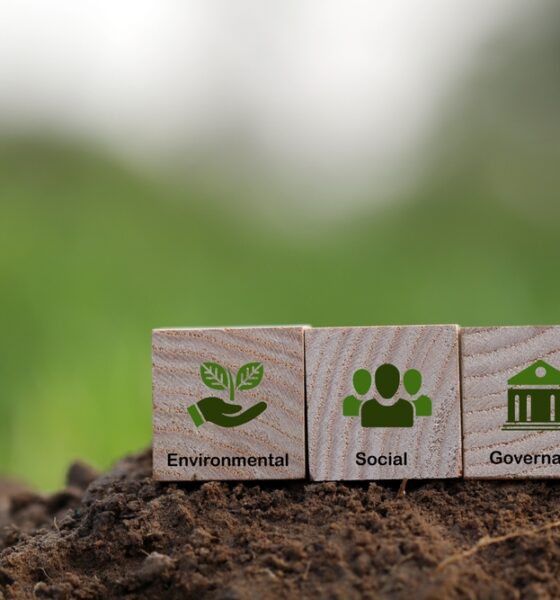

Environment
Why ESG Is Growing At Such A Rapid Rate And How Your Business Can Keep Up
ESG & sustainability reporting should be a central part of any modern business. ESG is growing at a rapid rate across all sectors and industries, and your business needs to keep up. What is ESG and how can you implement an ESG strategy that is effective in keeping your business up-to-date with the latest trends and ensures that your company outlook is progressive, inclusive, and forward-thinking?
What is ESG?
Environmental, social, and corporate governance (ESG) are the three main challenges that a modern business face. This includes climate change and working within a world that is attempting to cut down emissions, it includes human rights, equality, adherence with regulations and laws, and a whole host of other important issues. The importance and knowledge of ESG for business continues to grow.
Why is there a growth in acceleration of ESG implementation and investment?
Global sustainability plays a big part of this, with climate change already affecting most parts of the world with extreme weather events every year. Think about the risk of flooding and the like and the impact this can have on businesses, employees, suppliers, and customers. Alongside that, there is a big shift in how we perceive data and privacy, especially with the advent of GDPR in recent years. Also, there are other risk factors, demographic shifts, and regulatory challenges that crop up that were not on the agenda a few years ago. All of this makes for a pressing need to get your house in order, and the best way to do so is to implement an effective ESG and sustainability reporting strategy.
How to create an ESG strategy
There are a few steps that you can follow to implement an effective ESG strategy:
Get everyone on the same page – it is important that all areas of your organisation understand what ESG is, why it is being implemented, and that they are on board with your vision to ensure that it works in a practical sense. This should include stakeholders, management, and down to the newest of employees.
Look at your current system – once you have decided what areas of ESG are most important and relevant to your business and industry, you need to understand where you are currently and what needs to change to be where you need to be.
Set clear goals – the goals you set should be clear and relate to the business strategy you are implementing. Your goals should be achievable, laid out in a framework where everyone in your organisation can see how you will reach the targets, impressing investors in the process.
Set-up KPI and reporting processes – KPIs are crucial to ensure you are making progress as a business towards meeting your ESG goals. The strategy implemented should include room for the journey, building in key incremental signposts to give wiggle room for improvement where necessary.
How to keep up with ESG trends
Once you have your ESG strategy implemented it is important that you learn how to keep up with the latest trends and use the ESG reporting software to ensure that should you need to tweak direction at any point, you can do so effectively. Below are some important steps to follow to keep up with the latest ESG trends:
Keep an eye on the frameworks – there are different frameworks and guidelines to help you measure your ESG progress as a business. These include the Global Reporting Initiative (GRI), the Task Force on Climate-related Financial Disclosures (TCFD), the Sustainability Accounting Standards Board (SASB), and the United Nations Principles for Responsible Investment (UNPRI).
Open dialogue with stakeholders – speak to the people who have an influence on your business practice, such as employees, investors, suppliers, customers, regulators, and industry insiders. This can be undertaken through surveys, focus groups, forums, and online platforms. It helps to gain insight and feedback on your current practices to see where you need to improve.
Keep an eye on trends – the way in which ESG is viewed and implemented in practice continues to evolve over time. New issues crop up that were not present in previous years, and new urgency is attached to others for various reasons. Monitor trends to keep an eye on gaps in your ESG approach, use technology and ESG reporting software to make necessary changes as they appear.
ESG & Sustainability Reporting
ESG & sustainability reporting is a great way to stay on top of your ESG needs as a modern business. By bringing together data from all round your company and analysing it as it pertains to the different segments of your ESG policy, you can keep up with ESG trends and ensure that you are at the forefront of good working practice, climate action, equality, diversity, and human rights. This can be seen in the following key areas:
- Environmental – analyse the impact your business has on the environment, from your choice of suppliers, energy consumption, work processes, and overall carbon footprint of the company.
- Social – how do you manage relationships with customers, suppliers, and your own employees? What are the working conditions, health and safety standards, and diversity policies?
- Governance – leadership is vital to ESG, data should be tracked to look at internal controls, shareholder rights, audit processes, gender pay, executive pay, diversity of the board, and processes to deal with corruption.
Working with a reputable and professional company that provides the best and latest ESG & sustainability reporting software, maintains your position at the vanguard of ethical, forward-thinking business culture. It gives you the data and the tools to make any necessary changes to the way in which your business functions, shifting the focus to effective governance and operational nous.


 Environment12 months ago
Environment12 months agoAre Polymer Banknotes: an Eco-Friendly Trend or a Groundswell?

 Features11 months ago
Features11 months agoEco-Friendly Cryptocurrencies: Sustainable Investment Choices

 Features12 months ago
Features12 months agoEco-Friendly Crypto Traders Must Find the Right Exchange

 Energy11 months ago
Energy11 months agoThe Growing Role of Solar Panels in Ireland’s Energy Future




























